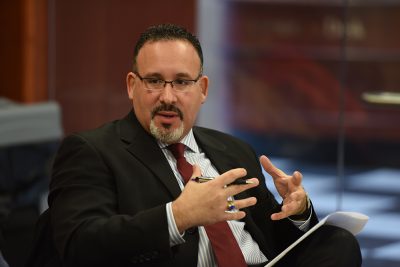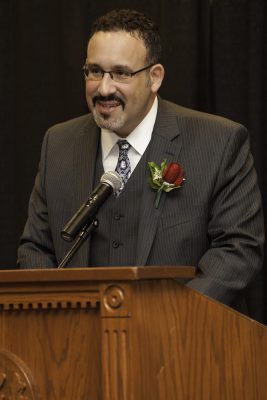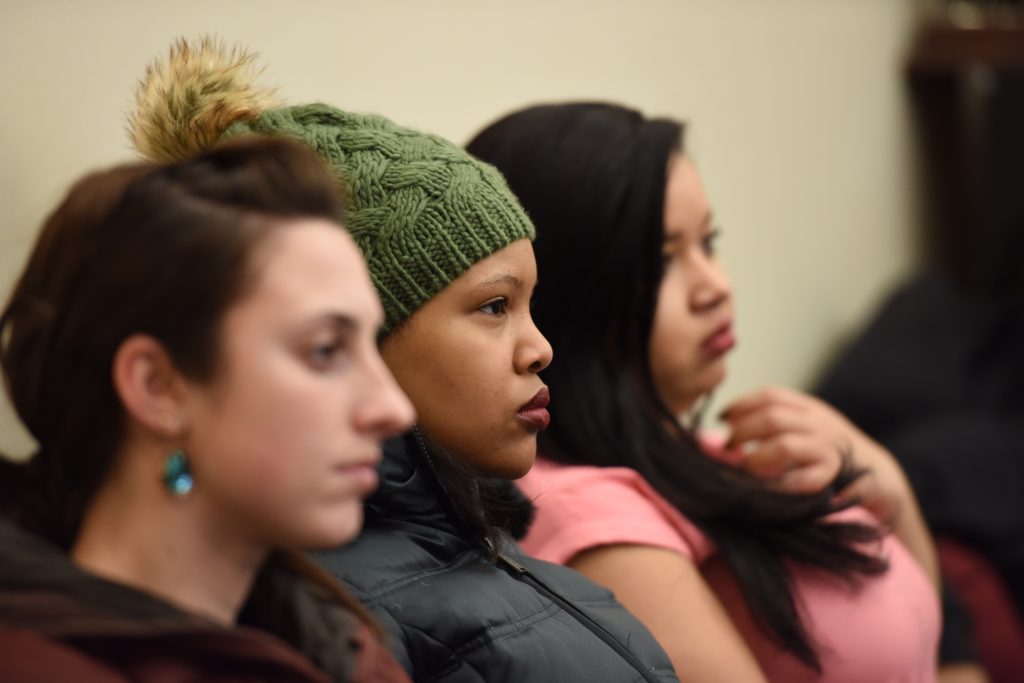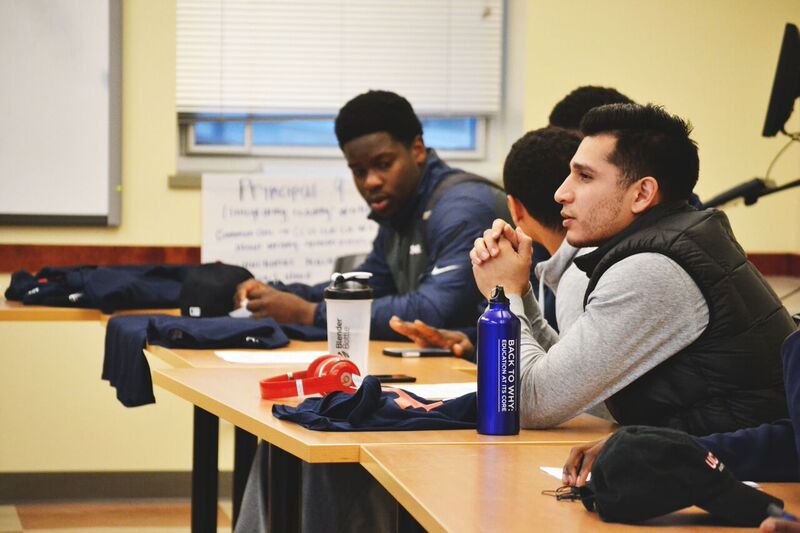New Haven Independent, Alum Kelvin Roldán ’15 6th Year and assistant professor Sarah Woulfin served on panel as consultants
Month: May 2017
10 Questions With Educational Leader and Alum Miguel A. Cardona
Editor's note: This piece originally appeared on the Neag School website and was written by Shawn Kornegay.
In our recurring 10 Questions series, the Neag School catches up with students, alumni, faculty, and others throughout the year to give you a glimpse into their Neag School experience and their current career, research, or community activities.

Four-time Neag School alumnus Miguel A. Cardona ’01 MA, ’04 6th Year, ’11 Ed.D., ’12 ELP is the assistant superintendent for teaching and learning at Meriden Public Schools in Meriden, Conn. Prior to that, he was a performance and evaluation specialist and also served for 10 years as a principal for Meriden Public Schools. In 2012, he was recognized by the Connecticut Association of Schools as Connecticut’s National Distinguished Principal and, in 2013, by the Neag School’s Alumni Board as Principal of the Year. Today, Cardona also serves as adjunct faculty in the Neag School’s UConn Administrator Preparation Program (UCAPP).
What drew you to the Neag School of Education?
As a fourth-grade teacher, I heard about a program that was being offered at UConn for a master’s degree in bilingual/bicultural education. After looking into it, I was hooked. Soon after, I was encouraged to join a leader preparation program. After researching different programs, I felt UCAPP was the best in the state, and I was honored to be accepted. Similarly, the Ed.D. and Executive Leadership programs were the ones that I felt best prepared me for a successful future in education and leadership. I feel blessed to have had the great learning opportunities at UConn over the last 20 years. The Neag School is a tremendous resource, not only as a school of education, but as partners as we work to improve education in Connecticut.
“Great educators build relationships with students and set a high bar for their growth. Great educators believe in the potential of their students, even if the students don’t yet. Great educators pay attention to detail and … value the importance of preparation.”
What led you to choose to pursue the field of education?
Kids. There are few things as gratifying as knowing that your hard work will improve the lives of children. Coming from a family who modeled service to others, I knew I wanted a profession that would give me the opportunity to serve others and help strengthen my community. Teaching did that. Initially, I wanted to become an art teacher. I love the arts and the important role it plays in the development of a person, but I gravitated toward elementary education once in the program. Being an elementary teacher is akin to being an artist, so I got the best of both worlds.
What do you believe makes a great educator?
Great educators are ones that do not look at their work as a job, [but] as an extension of their God-given gifts. The passion and commitment from great educators comes from within … Great educators build relationships with students and set a high bar for their growth. Great educators believe in the potential of their students, even if the students don’t yet. Great educators pay attention to detail and, like any other profession, value the importance of preparation. Whether that is lesson design, or getting to know their students, great teachers invest in their work — and they reap the benefits of their students’ success. … The role of teacher is the most important of all. Teachers shape lives.
How did the Neag School prepare you?
The Neag School prepared me in many ways. I had the fortune of learning from some of the best professors, latest research, and driven cohorts. Neag instructors balanced research and practice well, whether it was through program design that required field experience, or through partnerships with some of the leading thinkers and practitioners in the state. The coursework was enhanced with seminars, invitations to functions in the state, and guests that provided unique perspectives from which I grew.
What do you like about working with the Meriden School District?
I love being a part of the Meriden team. As a lifelong resident, and product of its schools, I love being a part of the important work for this city. I work with amazing people, and it is really important to me to remember that the decisions I make in my role as assistant superintendent affect all children, including my own.
What have you enjoyed about serving as an administrator?
It is about relationships. Working with adult learners and a greater number of families was a highlight of serving as building principal for 10 years. I enjoyed working with driven teachers whose input always made our building better. I learned so much from my colleagues and feel that my success is a result of the collective experiences I had as a teacher and school leader.
What are some recent initiatives of which you are most proud?
Serving as co-chairperson of the Connecticut Legislative Achievement Gap Task Force has been a great source of pride. It has resulted in legislation and practice that works to support student success in ways that make it truly the great equalizer it needs to be in this country. Supporting and advocating for quality programming for our youngest is some of the most rewarding work there is. At the local level, establishing systems that empower teacher collaboration and systematically raising the bar for tier 1 instruction have given me great pride. Another local initiative that brings me great pride is being able to bring community partners into the educational process. Whether that is a local agency aiming to improve the experiences of children after school or a local college that wants to collaborate to create a dual enrollment program for our high schoolers —connecting the K-12 experience to the community is a great source of pride and satisfaction.

What are your thoughts on the Neag School’s participation in the new University Preparation Program Initiative (UPPI) and how it will help school administrators?
I am thrilled we have an opportunity to partner with UConn in Meriden and know that the UPPI program will only enhance our work with leadership development. As a tier 1 research university, the resources we will benefit from will ultimately enhance the experiences of our learners in Meriden. Given the history I had with the educational leadership department at UConn, I look forward to a great partnership with the Meriden Public Schools.
Where do you see yourself in the future?
I hope to continue in this role in Meriden for the foreseeable future. I enjoy what I do and love that it is in the same community in which I live. I feel my role is an extension of my commitment to this community, my family, and to the children in Meriden. I hope to also continue teaching at the university level. The courses I teach at UConn for prospective leaders inspires me. I love the passion and energy of the students whose role will be to shape the educational landscape for the next 30 to 40 years. In my plans, I also expect to enjoy my 10- and 12-year-old as much as possible, and never miss a school concert.
What were some of your favorite moments at UConn?
As the son of two parents who sacrificed so much so their three children could have more than they ever had, the favorite moment for me was being hooded and earning my doctorate. I remember filling up a school bus with family and driving up to Storrs, Conn., for my graduation. When I crossed that stage, it represented the hard work, sacrifice, and guidance that was given to me by my parents and those that supported me. It was a highlight for me as a father also. It sent the message to my kids that the sky is the limit.
Read other installments of the Neag School’s 10 Questions series here.
Charter Schools Accuse San Jose School District of Trying to Poach Teachers
San Jose Inside, EDLR’s Preston Green comments on charter school problems in California
Experts Discuss Controversial Court Ruling About Students With Severe Disabilities
WNPR, EDLR’s Robert Villanova quoted during a special education summit about issues and solutions around CCJEF v. Rell
New Principal Appointed for Avon High School
Hartford Courant, EDLR alum and current doctoral student David Peling has been appointed principal
West Hartford Teacher of the Year Finalists Announced
we-ha.com, Luis Ramirez, a Neag School alumnus, is a Teacher of the Year finalist for West Hartford
New Study Highlights High Quality Career and Technical Education
MassBudget, A new research report by EDLR’s Shaun Dougherty was covered
Superintendent of Hartford Public Schools Visits EDLR Students
“Leaders must be close enough to relate to others, but far enough ahead to motivate them.”- John C. Maxwell
On April 24, 2017 students in Professor Joshua Hyman’s class, EDLR 6322: Economics of Education Reform were able to learn about and discuss the characteristics of this kind of servant leadership in education from the first hand account of Superintendent of Hartford Public Sc hools, Dr. Leslie Torres-Rodriguez, who was recently appointed after having served as interim superintendent since December 9, 2016, and her leadership abilities embody this quote.
hools, Dr. Leslie Torres-Rodriguez, who was recently appointed after having served as interim superintendent since December 9, 2016, and her leadership abilities embody this quote.
Torres-Rodriguez was an ELL, English Language Learner, student in Hartford Public Schools and having worked in the Greater Hartford Area for the past 22 years, has a strong connection with the community. Student Michael Corral commented, “She is invested in the city of Hartford, and is not trying to use it as a stepping stone to some other position or district.” The Superintendent herself expressed how important the success of the Hartford school district is to her personally, and not just as a job. She understands the families and students as she once felt she was a “disenfranchised” student of the school district, and now strives to be an agent for positive change and open ear for the concerns of the community.
Dr. Torres-Rodriguez maintains her relations with her constituents by being transparent, honest, accountable, and using feedback to focus on how policy and school leadership can improve. With an increasing number of ELL students and 20% of students being special education; she is mindful that change for the district is moving towards a more diverse population, and therefore requires policy to accommodate student needs. The superintendent brings an important humanistic element and strong academic qualifications into the field with her background in Human Development (B.S, University of Connecticut), Social Work (M.S., University of Connecticut), and Educational Leadership (Ed.D Central Connecticut State University). She believes that her less traditional path has furthered her skills as a leader in education as she brings an anthropological background to her passion for education.
During her visit, the superintendent gave insight into many of the challenges of her position as well as how she is managing these new challenges. Students in Professor Hyman’s class benefited from this discussion, as they were able to listen to her first hand experiences and see a glimpse of how a large local school district superintendent operates.
Student, Sarah Redlich, commented,
“I found her discussion of the different stakeholders she works with and how she considers the implications of decisions for the operation of the Hartford school system to be very interesting. The perspectives Dr. Leslie Torres-Rodriguez shared helped me explore the important decisions and considerations that are involved with being a school leader.”
This comes from a discussion about the multifaceted nature of being a superintendent. Dr. Torres-Rodriguez, does not just service Hartford Public schools, but she is in charge of overseeing the placement of Hartford students in other districts, a transition that Hartford funds, as well as some oversight over the cities’ magnet and charter schools. Because of this she must have strong community ties and an eye for good policy. She enlightened the class on managing funding, ensuring good relations with these other schools, and how to insure the academic and emotional well-being for a diverse population of students in the cities’ schools. Student. Michael Corral, particularly benefited from her discussion about the complexities of acquiring funding and developing a budget as he noted, 
“It was nice to listen about the application of funding models and how they are formulated with the best of intentions but can - at times - perpetuate many of the injustices they are supposed to address.”
It is key to note that the formula for a successful school district is not always easy, but Dr. Torres-Rodriguez shed light on how to weigh issues, remain transparent, and work with other stakeholders to develop good policy, and leave it adaptable as the nature of education is not static.
The class was highly engaged as they asked Dr. Torres-Rodriguez questions about her approach towards fiscal policy, diversifying student needs, maintaining enrollment in schools while respecting parent-school choice, and interacting with key stakeholders, such as the board, school leadership and her constituents. After these in-depth questions about her experience, student, Daron Cyr, asked a very important question, ‘How does she do it all?’
Dr. Torres-Rodriguez said that it was a combination of self-care, having a network of other educational leaders, who see things from the same systemic viewpoints, and her drive to help Hartford schools and students succeed. She emphasized her passion by saying, “If there was a hill I would die on, it would be this.” Meaning she is ready to do everything she can to work for this community. As a product of the system, and as someone, who has worked in Hartford for a long time she admits she has seen the city’s failures, but she also sees great potential, and this is what she is working towards.
This was a high-energy and inspiring conversation that the students actively benefited from. It brought life to the issues and policies the Ph.D students have learned about in professor Hyman’s class, and throughout their education. Professor Hyman commented on this experience,
“While my hope is that my students learn a lot about education policy from the course readings, discussion, and lecture, there is really no substitute for engaging with and learning from a long-time teacher and district administrator serving in disadvantaged communities.”
The Department of Educational Leadership extends a warm thank you to Dr. Torres-Rodriguez for providing insight into the inner workings of developing a budget, editing and adding policies all while maintaining a relationship with the community. This type of hands on experience offers our students an opportunity to engage with a local, yet high profile professional which contributes to their interactive classroom experience that Dr. Hyman works to create.